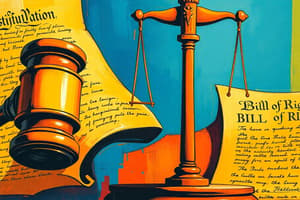Podcast
Questions and Answers
What are constitutional rights?
What are constitutional rights?
Constitutional rights are protections that ensure individual freedoms and prevent abuses of power.
Which amendments make up the Bill of Rights?
Which amendments make up the Bill of Rights?
The first 10 amendments of the Constitution make up the Bill of Rights.
What freedom does the First Amendment protect related to expressing opinions and ideas?
What freedom does the First Amendment protect related to expressing opinions and ideas?
The First Amendment protects free speech.
What freedom does the First Amendment ensure regarding religion?
What freedom does the First Amendment ensure regarding religion?
What right does the First Amendment protect related to the press?
What right does the First Amendment protect related to the press?
What amendment protects citizens' right to a trial by jury and to a speedy trial?
What amendment protects citizens' right to a trial by jury and to a speedy trial?
Which amendment protects citizens from being compelled to incriminate themselves?
Which amendment protects citizens from being compelled to incriminate themselves?
Which amendment protects citizens' right to be free from unreasonable searches and seizures?
Which amendment protects citizens' right to be free from unreasonable searches and seizures?
Which amendment protects citizens from being tried twice for the same offense?
Which amendment protects citizens from being tried twice for the same offense?
What amendment grants citizenship to all persons born or naturalized in the United States?
What amendment grants citizenship to all persons born or naturalized in the United States?
Flashcards are hidden until you start studying
Study Notes
Constitutional Rights: A Safeguard for Individual Liberties
The U.S. Constitution isn't just a piece of parchment with ink; it's a foundational document that establishes the rights and responsibilities of citizens, the government, and its branches. At the heart of this document lie constitutional rights, which are the protections that ensure individual freedoms and prevent abuses of power.
The Bill of Rights
The Bill of Rights, the first 10 amendments of the Constitution, outlines the fundamental rights and freedoms that Americans enjoy. These rights include:
- Free Speech: The First Amendment protects citizens' right to express their opinions and ideas, without fear of government retaliation.
- Religious Liberty: The First Amendment ensures Americans' freedom to practice their religion freely without government interference.
- Press Freedom: The First Amendment also protects citizens' right to a free press, providing for a more informed public.
- Assembly: The First Amendment protects the right of citizens to gather peaceably to express their opinions or to petition the government for a redress of grievances.
- Right to Petition: Citizens have the right to petition the government for a redress of grievances without fear of retribution.
- Right to Bear Arms: The Second Amendment protects citizens' right to keep and bear arms, although this right is subject to interpretation and debate.
- Trial by Jury: The Sixth Amendment protects citizens' right to a trial by jury and to a speedy trial.
- Protection from Self-incrimination: The Fifth Amendment protects citizens from being compelled to incriminate themselves.
- Protection from Unreasonable Searches and Seizures: The Fourth Amendment protects citizens' right to be free from unreasonable searches and seizures.
- Protection from Double Jeopardy: The Fifth Amendment protects citizens from being tried twice for the same offense.
Additional Constitutional Rights
Though the Bill of Rights is the most well-known collection of constitutional rights, there are other rights and protections throughout the Constitution. Some of these rights include:
- Citizenship: The Fourteenth Amendment grants citizenship to all persons born or naturalized in the United States.
- Due Process: The Fourteenth Amendment guarantees due process of law and equal protection under the law.
- Voting Rights: The Fifteenth, Nineteenth, and Twenty-Sixth Amendments protect citizens' rights to vote, regardless of race, gender, or age.
- Equal Protection: The Sixteenth Amendment ensures that taxation is fairly distributed among the states, and the Seventeenth Amendment provides for the direct election of Senators.
Amending the Constitution
Citizens' rights are not static. The Constitution provides mechanisms for updating and adapting to the changing needs and requirements of society. The process for amending the Constitution is outlined in Article V, and it requires either two-thirds approval by both houses of Congress or the ratification by three-fourths of the states.
The Importance of Constitutional Rights
The protection of constitutional rights is essential to maintaining a free and democratic society. These rights serve as a bulwark against abuses of power, ensuring that individual liberties are respected and that citizens have a voice in their government. The Constitution provides the framework for our political system, and the protection of constitutional rights helps to ensure that our government remains accountable to the people.
In conclusion, the protection of constitutional rights is essential to maintaining a free and democratic society. These rights provide citizens with the tools they need to participate in their government and to ensure that their voices are heard. By understanding and upholding these rights, we can help to create a more just and equitable society for all.
[Note: This is a general overview of constitutional rights in the United States and is not an exhaustive list of all constitutional rights and protections. The specifics and interpretations of constitutional rights can vary based on legal precedent and judicial interpretation.]
Studying That Suits You
Use AI to generate personalized quizzes and flashcards to suit your learning preferences.




